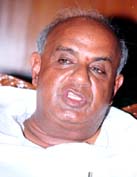Commentary/Vir Sanghvi
How long will Deve Gowda last?
 Are these the last days of the Deve Gowda government? The question
may seem surprising at first, After all, the prime minister seems
comfortably ensconced at Race Course Road. His family troops on
to an Air-India jet to join him on his trip to Zimbabwe. And it
is hard to see how the United Front's great rival, the BJP, can
find the majority required to take office.
Are these the last days of the Deve Gowda government? The question
may seem surprising at first, After all, the prime minister seems
comfortably ensconced at Race Course Road. His family troops on
to an Air-India jet to join him on his trip to Zimbabwe. And it
is hard to see how the United Front's great rival, the BJP, can
find the majority required to take office.
But appearances can be deceptive. And despite the self-described
poor farmer's willingness to touch as many people's feet as necessary,
the danger to him comes not from the Opposition, but from his
own allies in the United Front and from the Congress.
Part of the problem derives from the manner of his accession.
Deve Gowda was nobody's first choice for the job. His name came
up only after V P Singh and Jyoti Basu had said no; after Laloo
Yadav failed to gather the requisite support; and after Deve Gowda
himself threatened to walk out if R K Hegde was made prime minister.
When you are the least worst alternative, your position is always
unstable because all the others who believe they should have got
the job are convinced that you are not up to the task. The only
way to survive in such a situation is to manipulate your way through
and to expel your enemies. It worked for Indira Gandhi during
her first term. And it worked for Narasimha Rao.
But both had advantages that Deve Gowda does not. They were the
shrewdest political operators of their times. And they belonged
to the Congress, a party that rallies around the leader in nearly
all circumstances.
In Deve Gowda's case, the United Front (or the Janata Dal, the
Janata Party or the National Front as it used to be) has precisely
the opposite tradition. This is a grouping that thrives on dissent;
where all its constituents regard it as their scared duty to
stab the leader in the back.
Such dissidence usually takes a few months to come out into the
open and it is now beginning to be articulated. Chandrababu Naidu
is unhappy. Despite his own problems, Laloo Yadav is bitter. V P
Singh believes that his people have been neglected. G K Moopanar
is unimpressed by the government as a whole and displeased by
the action taken against the former Indian Bank chairman.
Moreover, the party's ally - the CPI-M - has taken to complaining
about everything at the slightest provocation. If this chorus
of criticism continues then the CPI-M will have painted itself into
a corner. When the revolt against Deve Gowda begins, the party
will be unable to back a man it has attacked on a weekly basis.
It is conceivable that Deve Gowda - who despite that show of sleepy
humility is an adept manipulator - can handle the criticism from
within the United Front. But there is no way to please Sitaram
Kesri and the Congress.
When the United Front government took office, most Congressmen
were bitterly disappointed. As the second-largest party in the
Lok Sabha, they believed that it was their right to take power
once A B Vajpayee's BJP regime had fallen. But the Congress could
not form a government because the Left and various constituents
of what later became the UF made it clear that they would not
back a government headed by Narasimha Rao. And unfortunately for
the party, Rao would not let anybody else head a Congress government.
Hence Congressmen had no choice but to back the UF almost against
their will. No sooner was Deve Gowda sworn in than they tried to
work out ways of getting some power for themselves. Sensing their
hunger for office and recognising that it posed a threat to his
position, Deve Gowda tried to get the Congress to join the government.
Once again, Narasimha Rao said no.
But now that Rao has been deposed (though he remains leader of
the Congress Parliamentary Party, he counts for little), the Congress
wants the power that it was forced to turn down. Unfortunately
for Deve Gowda, it no longer wants to be part of the government.
Now, it wants to be the government.
|





 Are these the last days of the Deve Gowda government? The question
may seem surprising at first, After all, the prime minister seems
comfortably ensconced at Race Course Road. His family troops on
to an Air-India jet to join him on his trip to Zimbabwe. And it
is hard to see how the United Front's great rival, the BJP, can
find the majority required to take office.
Are these the last days of the Deve Gowda government? The question
may seem surprising at first, After all, the prime minister seems
comfortably ensconced at Race Course Road. His family troops on
to an Air-India jet to join him on his trip to Zimbabwe. And it
is hard to see how the United Front's great rival, the BJP, can
find the majority required to take office.